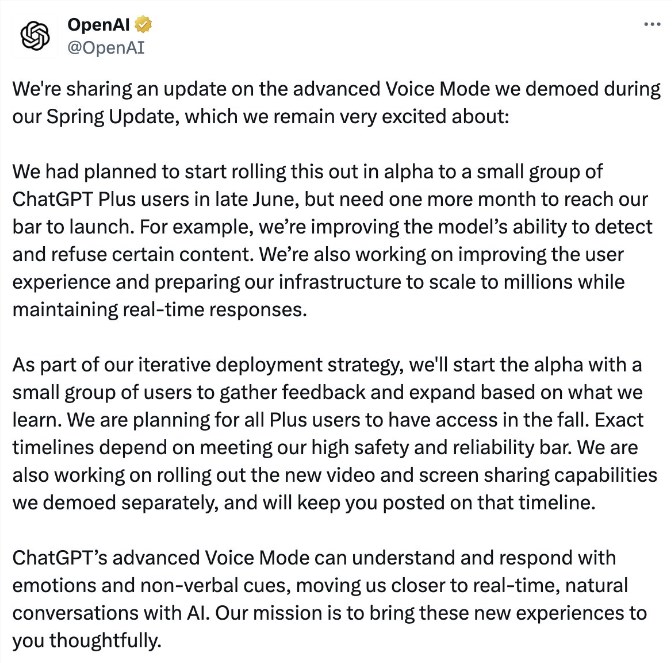OpenAI recently announced that the alpha test of ChatGPT advanced voice mode will be postponed to the end of July. It was originally planned to be open to some ChatGPT Plus users at the end of June. This delay is to improve the security and reliability of the model and improve the user experience to ensure smooth response speed when expanding to a larger user scale.
OpenAI is working hard to improve the model’s content detection and rejection mechanisms, while optimizing the user interface and preparing the necessary technical infrastructure. They will use an iterative deployment strategy, opening alpha testing to a small group of users first, collecting feedback and gradually expanding the scope of testing. All Plus users are expected to gain access in the fall, but the timing depends on the results of security and reliability testing.
OpenAI recently released the latest progress report on ChatGPT advanced voice mode. This advanced feature, demonstrated in the spring update, was originally scheduled to be available for alpha testing to a small number of ChatGPT Plus users at the end of June, but will now take another month to reach release standards.
It is reported that the development team is working hard to improve the model's ability to detect and reject certain content. At the same time, they are also improving the user experience and preparing related infrastructure to ensure that they can maintain real-time responsiveness as they scale to millions of users.
As part of an iterative deployment strategy, OpenAI plans to first open alpha testing to a small group of users to gather feedback and gradually expand the scope based on learning results. The company expects all Plus users to gain access this fall, but the exact timeline depends on meeting its strict security and reliability standards.
In addition, OpenAI is also separately developing the new video and screen sharing functions previously demonstrated, and promises to promptly report relevant progress.
ChatGPT’s advanced speech mode is able to understand and respond to emotional and non-verbal cues, which will bring us closer to the goal of real-time, natural conversations with AI. OpenAI says its mission is to bring these new experiences to users in a thoughtful and careful way.
This decision to delay the release reflects OpenAI’s cautious approach when rolling out new features to ensure the maturity and security of the technology. Nonetheless, users can still look forward to experiencing this revolutionary AI voice interaction feature in the near future.

OpenAI’s cautious attitude towards ChatGPT’s advanced voice mode reflects its emphasis on technical security and user experience. Although the release date has been delayed, it is believed that this feature will eventually bring users a more natural and smoother AI interaction experience.